TeamUp Uganda
Improved livelihood prospects for young people
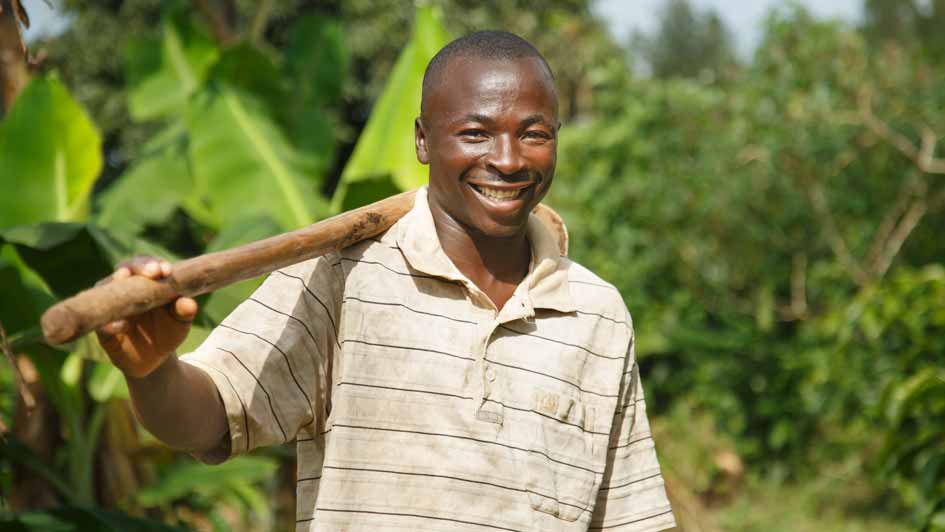
Establishing new life perspectives for young people in rural Uganda is the goal of TeamUp Uganda. The program is a cross-sectoral collaboration with the German Federal Ministry for Economic Cooperation and Development (BMZ), the Deutsche Stiftung Weltbevölkerung (German Foundation for World Population) and the Hanns R. Neumann Stiftung, as well as local partners Action 4 Health Uganda and Whave Solutions. The program’s comprehensive approach supports young people to find new avenues of employment, take part in public life and policy development, and lead healthy, self-determined lives. After a successful four-year pilot phase, the program will enter its second phase in 2022.
TeamUp Uganda Impact Video
TeamUp started in Mityana District in 2018, and in 2022 the program will enter its second phase, reaching more youth in Mityana and Kassanda.
© Siemens Stiftung
ProgramIncreased income and reliable health care in Mityana District
Uganda has one of the youngest and fastest growing populations in the world. Between 1998 and 2022, it more than doubled from 22.5 to 45.9 million.¹ Over 70% of the population is under 30 years old. TeamUp is addressing the day-to-day realities of young people in rural Uganda to improve their future prospects in a sustainable way. The program responds to the complexity of the challenges facing young people with a holistic approach that integrates economic, social, health, educational and infrastructural components.
Focus on income and health
Focus is on improving the living conditions of young people through increased income and reliable health care, including barrier-free access to family planning counseling, and the supply of clean water. Young people are supported in making informed decisions for a healthy and self-determined life, as well as in actively shaping development policy processes. TeamUp also aims to reduce migration to urban centers, which is currently around 30 percent of the youth living in Mityana.²
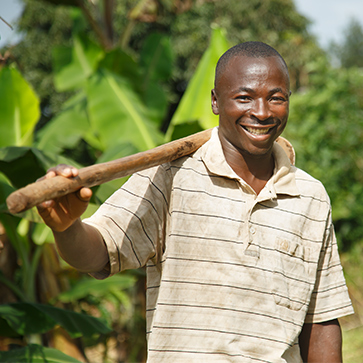
Pilotproject in Mityana
The pilot program started in Uganda in 2018 and reached about 50,000 young people aged 15 to 30 and their families in five sub-counties of Mityana District. TeamUp documents results and learning outcomes from the outset. It is also being systematically monitored by an external scientific institute for evaluation so that the results can be used for further activities and made available to the public.
The evaluation report issued at the end of the pilot phase shows:
- The targeted youth make conscious and informed decisions about leading a healthy and self-determined life.
- The economic situation of the participating youth has improved.
- The target groups, especially female youth, are making their voices heard and influencing decisions that affect their lives.
- A proven and scalable holistic approach to youth empowerment in East Africa is available.
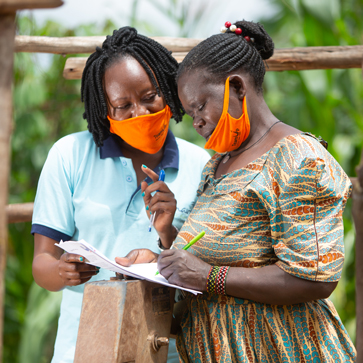
Scaling in Phase 2
TeamUp started in Mityana District in 2018, and in 2022 the program will enter its second phase, reaching more youth in Mityana and Kassanda. The project will run for 44 months and the German partner organizations will invest 9 million euros. In addition, the foundations provide an Innovation Fund to support innovative solutions that contribute to TeamUp’s objectives.
TeamUp Innovation Fund strengthens impact
Together with our partner foundations Deutsche Stiftung Weltbevölkerung and Hanns R. Neumann Stiftung, we are supporting solutions that bring more equity, sustainable essential services, and economic prospects. The aim is to strengthen initiatives for the equitable involvement of youth, women and people with disabilities.
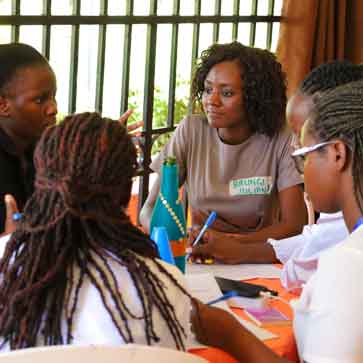
PartnersUnique cooperation between foundations and BMZ
TeamUp adopts a multisector approach. The partnership between foundations, the Ugandan partners and the German Ministry for Economic Cooperation and Development (BMZ) leverages synergies and collaboration to achieve better and more comprehensive results. The program brings together the strengths and innovation potential of each of the participating partners for the first time, which increases the positive impact of their local activities and helps more people. This collaborative approach efficiently pools public and civil society resources at the international and local level to permanently improve structures.
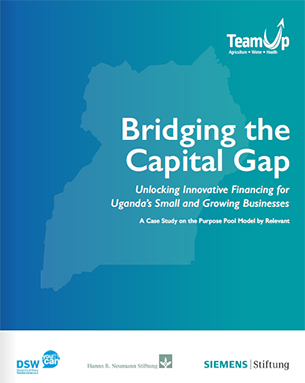
Case Study
Despite growing investment, many small businesses in Uganda still lack access to finance. Our booklet presents innovative models such as the Purpose Pool, which can close this gap through community financing.
Cooperation partners from Uganda and Germany
The initiative brings together German and Ugandan development partners. It is designed as a long-term effort that is scalable and open to additional collaborators. New private and public sector partners for financing and implementation can become part of the consortium by contributing their expertise to the multisector approach. Funding for TeamUp is divided between the participating foundations and BMZ, with each contributing half. A total of six million euros has been committed to the first three years of the pilot program in Uganda.
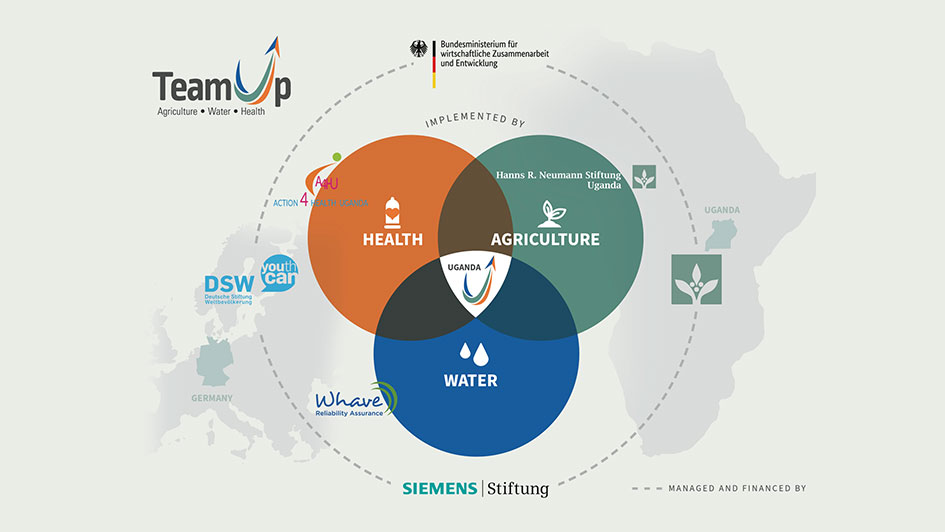
ObjectiveReliable access to water and sanitary facilities
As part of the project, Siemens Stiftung and its implementation partner Whave Solutions are supporting the development of a sustainable and innovative approach to water maintenance. This is because currently just one in three households and only 40 percent of schools in Mityana and Kassanda have access to a functioning water source. For many years, lack of access to clean water has been one of the main reasons for girls missing school and resulting early motherhood, poor sanitation in rural areas, and child mortality from waterborne diseases. The biggest challenge is the maintenance of water sources, many of which are out of service due to a lack of management and maintenance structures.
Furthermore, Siemens Stiftung is working with local partners to improve sanitation and hygiene conditions in schools and to improve irrigation options for smallholder farmers. The development of joint approaches to small-scale entrepreneurship and income generation for young people is also anchored in the program. In doing so, Siemens Stiftung draws on its expertise and network in the fields of water and sanitation, technology and social entrepreneurship.
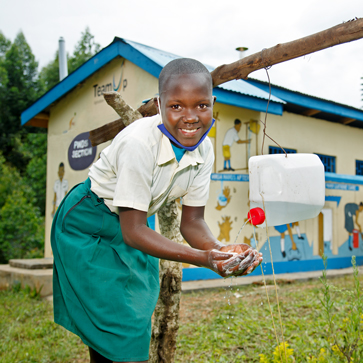
Whave Solutions as a strong local partner
The local partner for the reliable supply of clean water to rural schools, clinics and homes is the Ugandan social enterprise Whave Solutions. Whave works with local authorities and communities to create stable structures for public-private partnerships that comply with the national government policy on safe water supply. Under the policy, professional maintenance service providers are appointed by the local government. The service providers collect affordable fees from the municipal water committees to ensure that the water supply in the municipalities functions reliably.
Whave has been contracted by many communal water authorities as a maintenance service provider and trains local technicians in preventive maintenance and repair. The introduction of regular professional maintenance by the Ugandan government addresses the problem of frequent and prolonged water supply outages. In Uganda, Whave is the leading maintenance service provider. The social enterprise is setting an example of cost-effectiveness and performance, helping other service providers to start work in other regions, supporting the government in implementing national targets for water supply maintenance and repair, and ensuring that hundreds of communities are supplied with safe water every day. The social enterprise provides a toll-free telephone line to all communities it serves and advocates for women to hold leadership
positions on community water committees.
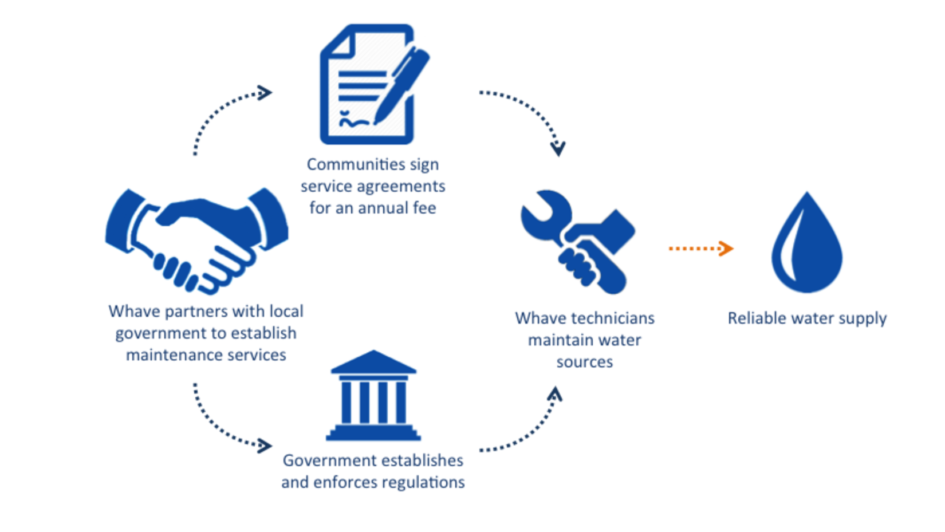
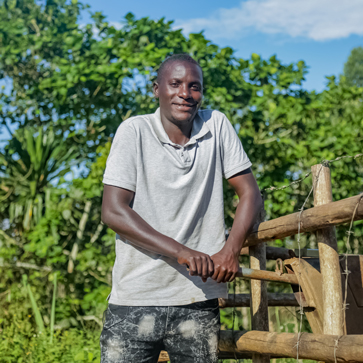
Contact
Project manager
Elisabeth Biber
elisabeth.biber@siemens-stiftung.org
LinksWould you like to learn more?
Social Media
Websites
References
1 Bundesministerium für wirtschaftliche Zusammenarbeit und Entwicklung
2 National Population and Housing Census 2014


